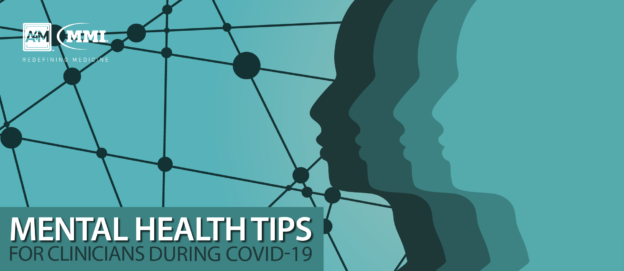In the difficult time of the novel coronavirus outbreak, the healthcare industry and its dedicated professionals are working around the clock to treat patients and prevent the further spread of the infection. As the first line of defense against the disease, physicians must maintain not only their physical health by practicing current safety practices, but also protect their mental health despite rising stress levels, long work hours, and prevailing uncertainty. In an effort to ease the psychosocial symptoms accompanying the epidemic, a recent article published in Medical Economics outlines several suggestions for physicians and other care providers to help them cope during this extremely demanding period.
Manage Stress Levels
Managing stress levels and psychological wellbeing is as essential during this time as ever. High-pressure conditions have been directly tied to negative effects on physical health; increased cortisol production has a well-established relationship with decreased immune system functioning. Although health care providers are likely to be experiencing severe levels of stress at this time, simple coping techniques can provide relief. To help alleviate stress, professionals are encouraged to ensure a healthy diet, adequate sleep, and the use of relaxation techniques – all of which can help clinicians cope with the increased demands of their jobs at this time while having positive effects on their overall wellbeing.
Prioritize Basic Needs
As mentioned above, ensuring adequate rest during work hours or between shifts as well as eating sufficient amounts of healthy food are basic necessities for coping in a time of emergency. Other positive strategies include engaging in physical activity when possible and staying in close contact with family and friends. Clinicians are urged to avoid employing adverse coping mechanisms, such as tobacco, alcohol, or other drug use as these can worsen mental and physical health in the long term and make the current situation more difficult to handle.
Stay Connected
During a period of required social distancing and isolation, it is vital to maintain contact with family, friends, and colleagues to ensure access to social support. Staying connecting throughout the day has never been easier with digital technologies facilitating constant contact and allowing people to remain in touch despite physical distancing.
As it may be difficult for healthcare providers to see their loved ones or maintain physical contact for fear of spreading the infection, it is crucial to call, FaceTime, message, and reach out in other ways. It is also important to ensure diverse forms of communication are being used – that do not solely rely on written words – to connect with individuals with intellectual, cognitive, and psychosocial disabilities, especially if you are a team leader or manager in a healthcare facility.
Work Together
Ensuring good quality communication across staff members can facilitate working together during this time. Individuals in managerial positions are encouraged to support the mental health of medical professionals in any way they can. This should include rotating workers from high-stress to lower-stress functions to ensure they can get adequate rest. Inexperienced workers should be paired with more experienced employees to help provide support, monitor stress, and reinforce safety procedures. Further, healthcare providers should be encouraged to take breaks, while flexible schedules should be implemented for workers who are directly or indirectly impacted by the COVID-19 infection.
Promote Access to Support Services
Team leaders and managers of healthcare facilities are asked to ensure their staff has access to mental health and psychosocial support services, not only during these difficult times but at all other times as well. While individuals in leadership positions can and should provide positive role models for self-care strategies to help mitigate stress, they are not immune to the psychological toll of the COVID-19 outbreak. It is important to remember that these individuals are also be experiencing increased levels of stress and feelings of pressure, requiring access to support services as well.
Educating medical professionals on how to provide basic emotional support to affected people and each other using psychological first aid is a necessary step. Some strategies include speaking and acting calmly, creating connections and building relationships, as well as encouraging mindfulness via proven relaxation techniques. A more comprehensive guide to psychological first aid can be found here.
Beyond combating the coronavirus outbreak, a current priority is ensuring the physical safety and mental health of healthcare providers worldwide. Managing stress, connecting with others, and making sure to prioritize basic needs in this emergency situation can help drive positive outcomes for both providers and their patients, who need the support of the healthcare workforce more than ever.

